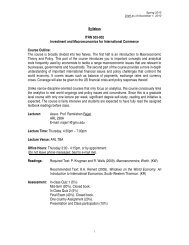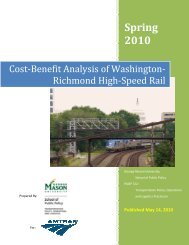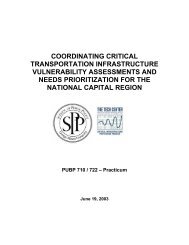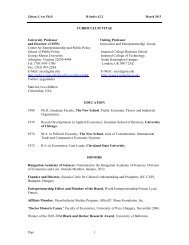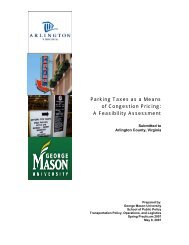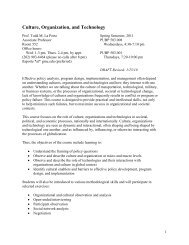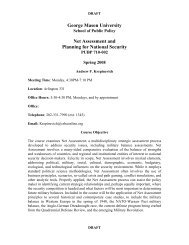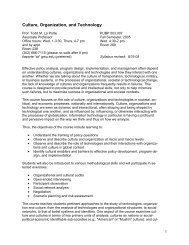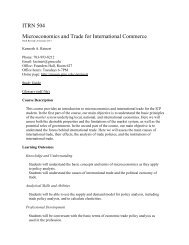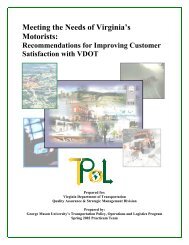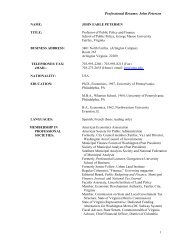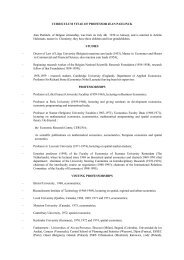PUBP 741-001 - George Mason University
PUBP 741-001 - George Mason University
PUBP 741-001 - George Mason University
You also want an ePaper? Increase the reach of your titles
YUMPU automatically turns print PDFs into web optimized ePapers that Google loves.
<strong>PUBP</strong> <strong>741</strong><br />
U.S. Financial Policy Processes and Procedures Steven Maguire<br />
<strong>George</strong> <strong>Mason</strong> <strong>University</strong> smaguire@crs.loc.gov<br />
School of Public Policy Office: ARL 290<br />
Spring 2010: Tuesday 7:20-10:00PM Hours: Tuesday 6:00-7:00PM<br />
Course Description. The course examines the design and operation of expenditure and<br />
revenue systems at federal, state, and local levels of government. It focuses on the<br />
mobilization and allocation of resources through planning, adoption, and execution of the<br />
budget. In addition to the theory and policy objectives of tax and spending regimes, the<br />
course provides a review of financial controls, performance measurement, cash and debt<br />
management, and accounting and financial reporting systems.<br />
Requirements. The course requires (1) two research papers, each 10 to 12 pages long,<br />
the first descriptive and the second analytical; (2) a midterm and final examination; and<br />
(3) class participation including presentation of the second paper.<br />
Research Paper I: 20%<br />
Research Paper II: 30%<br />
Midterm: 15%<br />
Final: 25%<br />
Participation: 10%<br />
Required Books.<br />
Mikesell, John. Fiscal Administration, 7 th edition. Thomson Wadsworth, 2007<br />
Schick, Alan. The Federal Budget, 3 rd edition. Washington D.C.: Brookings Institution<br />
Press, 2007.<br />
Recommended Reading.<br />
National Association of State Budget Officers, Budget Processes in the States<br />
Paper I<br />
Paper I should describe the budget process for a State of your choosing. The objective of<br />
this paper is for you to show me you understand the terms and principles of public<br />
budgeting and finance. This paper should be less than 10 pages, but should cover all of<br />
the important aspects of public budgeting. Teams of two students are allowed.<br />
Paper II<br />
Paper II should analyze the budget described in Paper I. This paper will use much of the<br />
information provided in Paper I in the analysis of the chosen state budget. The current<br />
budget situation (FY2010 and FY2011) of that state should form the basis of analysis.
The analytical tools provided in the readings contained in Mikesell, Schick, and other<br />
assignments. Again, teams of two students are allowed.<br />
Publication Opportunity for Student Papers<br />
New Voices in Public Policy: I will consider nomination the very best papers in this<br />
course for publication in New Voices in Public Policy. New Voices is a student- and<br />
faculty-reviewed journal that shares SPP’s finest student work with the rest of the world.<br />
Class Schedule<br />
Date Class Readings Other<br />
January 19 1 Introduction<br />
January 26 2 Mikesell Chapters 1<br />
Schick Chapter 1<br />
TBD<br />
February 2 3 Mikesell Chapter 2<br />
Schick Chapter 1<br />
Economic Report of the<br />
President<br />
Submit Paper I topic<br />
February 9 4 Mikesell Chapters 2 and 3<br />
Schick Chapters 2<br />
Penner June 10, 2008 Testimony<br />
TBD<br />
February 16 5 Mikesell Chapters 4 and 5<br />
Schick Chapter 3 and 4<br />
TBD<br />
February 23 6 Mikesell Chapter 6<br />
Schick Chapter 5<br />
Paper I Due<br />
March 2 7 Midterm first hour<br />
Mikesell State Tax Notes<br />
Schick Chapters 6 and 7 Article<br />
March 9 no class Spring Break<br />
March 16 8 Mikesell Chapter 7 TBD<br />
March 23 9 Mikesell Chapters 8 and 9 TBD<br />
March 30 10 Mikesell Chapter 10<br />
TBD<br />
April 6 11 Mikesell Chapter 11<br />
April 13 12 Mikesell Chapter 13<br />
NASBO Fiscal Survey of States<br />
Maguire CRS report<br />
April 20 13 Mikesell Chapter 14<br />
Schick Chapters 8 and 9<br />
TBD<br />
TBD<br />
April 27 14 Schick Chapters 10 and 11 TBD<br />
May 4 no class Reading Day<br />
May 11 15 Final 7:30pm to 10:15pm<br />
Paper II Due
SPP Policy on Plagiarism, as follows:<br />
The profession of scholarship and the intellectual life of a university as well as the field<br />
of public policy inquiry depend fundamentally on a foundation of trust. Thus any act of<br />
plagiarism strikes at the heart of the meaning of the university and the purpose of the<br />
School of Public Policy. It constitutes a serious breach of professional ethics and it is<br />
unacceptable.<br />
Plagiarism is the use of another’s words or ideas presented as one’s own. It includes,<br />
among other things, the use of specific words, ideas, or frameworks that are the product<br />
of another’s work. Honesty and thoroughness in citing sources is essential to<br />
professional accountability and personal responsibility. Appropriate citation is necessary<br />
so that arguments, evidence, and claims can be critically examined.<br />
Plagiarism is wrong because of the injustice it does to the person whose ideas are stolen.<br />
But it is also wrong because it constitutes lying to one’s professional colleagues. From a<br />
prudential perspective, it is shortsighted and self-defeating, and it can ruin a professional<br />
career.<br />
The faculty of the School of Public Policy takes plagiarism seriously and has adopted a<br />
zero tolerance policy. Any plagiarized assignment will receive an automatic grade of<br />
“F.” This may lead to failure for the course, resulting in dismissal from the <strong>University</strong>.<br />
This dismissal will be noted on the student’s transcript. For foreign students who are on<br />
a university-sponsored visa (eg. F-1, J-1 or J-2), dismissal also results in the revocation of<br />
their visa.<br />
To help enforce the SPP policy on plagiarism, all written work submitted in partial<br />
fulfillment of course or degree requirements must be available in electronic form so that<br />
it can be compared with electronic databases, as well as submitted to commercial services<br />
to which the School subscribes. Faculty may at any time submit student’s work without<br />
prior permission from the student. Individual instructors may require that written work be<br />
submitted in electronic as well as printed form. The SPP policy on plagiarism is<br />
supplementary to the <strong>George</strong> <strong>Mason</strong> <strong>University</strong> Honor Code; it is not intended to replace<br />
it or substitute for it.<br />
Statement on special needs of students (aka: reasonable standard accommodation<br />
language):<br />
If you are a student with a disability and you need academic accommodations, please see<br />
me and contact the Disability Resource Center (DRC) at 993-2474. All academic<br />
accommodations must be arranged through the DRC.



